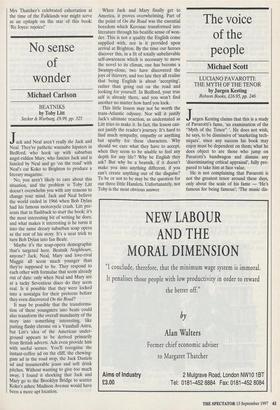No sense of wonder
Michael Carlson
BEATNIKS by Toby Litt Secker & Warburg, £9.99, pp. 325 Jack and Neal aren't really the Jack and Neal. They're pathetic wannabe hipsters in Bedford, who hook up with suburban angst-ridden Mary, who fancies Jack and is fancied by Neal and go 'on the road' with Neal's cat Koko to Brighton to produce a literary magazine.
No, you aren't likely to care about this situation, and the problem is Toby Litt doesn't overwhelm you with any reasons to change your mind. Jack and Neal believe the world ended in 1966 when Bob Dylan had his famous motorcycle crash. Litt pre- sents that in flashback to start the book; it's the most interesting bit of writing he does, and what makes it interesting is he turns it into the same dreary suburban soap opera as the rest of his story. It's a neat trick to turn Bob Dylan into Ian Beale.
Maybe it's the soap-opera demographic that's targeted here. Beatnik Neighbours, anyone? Jack, Neal, Mary and love-rival Maggie all seem much younger than they're supposed to be. They respond to each other with formulae that seem already out of date: only when Neal and Mary are at a tacky Seventiess disco do they seem real. Is it possible that they were locked into a nostalgia for their preteens before they even discovered On the Road?
It may be possible that the transforma- tion of these youngsters into beats could also transform the overall mundanity of the story into something interesting, like putting flashy chrome on a Vauxhall Astra, but Litt's idea of the American under- ground appears to be derived primarily from British adverts. Ads even provide him with useful scenes. You'll recognise the instant-coffee ad on the cliff, the chewing- gum ad in the road stop, the Jack Daniels ad and innumerable jeans and soft drink pitches. Without wanting to give too much away, I found it shocking that Jack and Mary go to the Brooklyn Bridge to scatter Koko's ashes; Madison Avenue would have been a more apt location.
When Jack and Mary finally get to America, it proves overwhelming. Part of the point of On the Road was the essential boredom which Kerouac transformed into literature through his beatific sense of won- der. This is not a quality the English come supplied with, nor is it provided upon arrival at Brighton. By the time our heroes discover this, in a fit of totally unbelievable self-awareness which is necessary to move the novel to its climax, one has become a Swampy-clone, two have discovered the joys of thievery, and too late they all realise that being English is about 'accepting', rather than going out on the road and looking for yourself. In Bedford, your true self is already there, and you won't find another no matter how hard you look.
This little lesson may not be worth the trans-Atlantic odyssey. Nor will it justify Jack's ultimate reaction, as understated as Litt tries to make it. In fact, the lesson can- not justify the reader's journey. It's hard to find much sympathy, empathy or anything but apathy for these characters. Why should we care what they have to accept, when they seem to be unable to feel any depth for any life? Why be English they ask? But why be a beatnik, if it doesn't make you into anything different, if you can't create anything out of the disguise? To be or not to be may be the question for our three little Hamlets. Unfortunately, not Toby is the most obvious answer.


































































 Previous page
Previous page